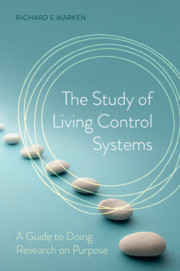Book contents
- The Study of Living Control Systems
- Endorsements for Living Control Systems
- The Study of Living Control Systems
- Copyright page
- Contents
- Figures
- Tables
- Preface
- 1 Living Control Systems
- 2 Doing Research on Purpose
- 3 Getting Started
- 4 Basic Research on Purpose
- 5 Exploring the Hierarchy
- 6 Learning
- 7 Social Control
- 8 Back to the Future (of PCT Research)
- Bibliography
- Index
1 - Living Control Systems
Published online by Cambridge University Press: 02 February 2021
- The Study of Living Control Systems
- Endorsements for Living Control Systems
- The Study of Living Control Systems
- Copyright page
- Contents
- Figures
- Tables
- Preface
- 1 Living Control Systems
- 2 Doing Research on Purpose
- 3 Getting Started
- 4 Basic Research on Purpose
- 5 Exploring the Hierarchy
- 6 Learning
- 7 Social Control
- 8 Back to the Future (of PCT Research)
- Bibliography
- Index
Summary
Research on purpose is based on the fact that the behavior of organisms is a control process. What we call “behavior” are controlled results of an organism's actions. Controlled results are consistent results produced in the face of disturbances that should prevent such consistency. The ability to produce controlled results is explained by control theory, which shows that the behavior of living systems is organized around the control of perceptual variables. Thus, the application of control theory to understanding the behavior of organisms has come to be called Perceptual Control Theory or PCT. PCT shows that in order to understand purposeful behavior it is necessary to determine the perceptual variables that organisms control: controlled variables. So the main goal of research on purpose is the discovery of the variables that organisms control. The next chapters explain how to do research on purpose.
Keywords
- Type
- Chapter
- Information
- The Study of Living Control SystemsA Guide to Doing Research on Purpose, pp. 1 - 17Publisher: Cambridge University PressPrint publication year: 2021

